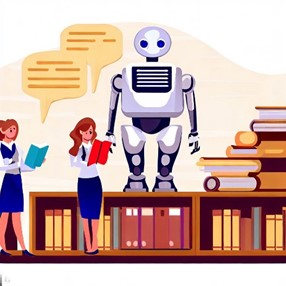Introduction
Research is a vital but challenging part of academic work. It involves finding, reading, analysing, and synthesising large amounts of information from various sources. It also requires writing, editing, and proofreading papers that are clear, coherent, and convincing. These tasks can be time-consuming and tedious, leaving little room for creativity and innovation. Fortunately, artificial intelligence (AI) can help researchers overcome these challenges and enhance their research efficiency and quality. AI-powered tools can assist researchers with various aspects of their work, such as literature review, writing, editing, citation management, and more. However, there are some limitations and drawbacks of using such tools for academic articles. In this article, we will explore some of the best AI tools for scholarly articles and how they can benefit researchers.

AI Tools for Scholarly Articles
AI tools can help researchers with different stages of their research process, from finding relevant papers to writing and publishing them. Some benefits of using AI tools are:
– They can save time and effort by automating tedious and repetitive tasks, such as searching for papers, summarising them, extracting key information, and generating citations.
– They can improve the quality and accuracy of research by providing data-driven insights, feedback, and suggestions, as well as detecting and correcting errors in grammar, spelling, and style.
– They can enhance the creativity and originality of research by generating new ideas, content, and headlines, as well as finding hidden connections and patterns among research topics.
Examples of Popular AI Tools for Scholarly Articles
There are many AI tools available for scholarly articles, each with its own features and functions. Here are some examples of popular AI tools that researchers can use:
– Semantic Scholar:
Academic search engine that helps researchers find relevant and trustworthy papers for their research topic. It also provides single-sentence summaries, similar paper recommendations, and citation evaluation for each paper.
– Bit.ai:
Research organization tool that helps researchers store, manage, and collaborate on their online research sources. It supports various formats of content, such as blogs, articles, videos, infographics, and images.
– Scholarcy:
Research summarization tool that helps researchers extract key points, figures, and references from academic articles. It also generates flashcards and outlines for each article to help researchers review and remember the main takeaways.
– Scite:
Citation evaluation tool that helps researchers check the reliability and impact of citations in academic papers. It also provides smart citations that show how a paper has been supported or contradicted by other papers.
– Trinka:
Research paper writing tool that helps researchers improve their grammar, style, and clarity in academic writing. It also provides feedback on the overall structure and flow of a paper.
– CopyAI:
Helps researchers generate creative and engaging content for their academic papers, such as introductions, conclusions, headlines, and bullet points. It uses natural language generation to produce high-quality text based on the researcher’s input.
– Rytr:
Helps researchers write faster and better by providing suggestions, templates, and feedback for their academic writing. It also allows researchers to choose from different writing styles and tones to suit their audience and purpose.
– Elicit:
Helps researchers automate research workflows, such as finding relevant papers, summarizing takeaways, and extracting key information from academic articles. It uses language models to answer questions with research evidence.
– HyperWrite:
Helps researchers improve their academic writing style by providing suggestions for word choice, sentence structure, and tone. It also analyses the readability and complexity of a paper.
– Moonbeam:
AI writing assistant that helps users compose essays, stories, articles, blogs, and other long-form content.
– Grammarly:
Popular tool for proofreading and editing academic papers. It detects and corrects errors in grammar, spelling, and punctuation, as well as provides suggestions for improving vocabulary, clarity, and tone.
– Mendeley:
Helps researchers manage their citations and references for their academic papers. It integrates with PDF readers and Microsoft Word to detect citations and quickly generate a bibliography.
– Zotero:
A free, easy-to-use tool to help researchers collect, organize, annotate, cite, and share research. It streamlines the citation process and supports various formats and styles.
– IBM Watson Discovery:
Helps researchers analyse and extract the necessary information from scientific papers and provide an overview of the information, summarizing it in an understandable format.
– ProWritingAid:
Helps researchers improve their writing skills by detecting and correcting spelling, grammar, and stylistic errors, as well as providing feedback on the readability and structure of a paper.
– Paper Digest:
A tool that helps researchers summarize academic articles in a few sentences, highlighting the main points and contributions of each paper.
– Consensus:
A search engine for providing Evidence-Based Answers.
Benefits of AI Tools for Scholarly Articles
When it comes to writing a scholarly article, time is of the essence. Research, analysis, and drafting can take weeks or even months. Combine that with the pressure of deadlines, and you have a recipe for stress. AI tools can help alleviate some of the load by simplifying the process and increasing productivity. One benefit of AI tools is time-saving. They can automate several tasks, such as citation management and proofreading, reducing the workload for researchers and helping them focus on creating high-quality content. Efficiency enhancement is another advantage, as AI-based writing assistance tools can suggest vocabulary and phrasing that improve the clarity and coherence of the content. Moreover, AI tools can aid in producing higher-quality research. For instance, automated literature reviews can analyse hundreds of articles and find relevant data more quickly and accurately than manual searches. All in all, AI tools can significantly reduce the time and effort researchers put into scholarly articles while improving quality. They can be a valuable addition to any writer’s toolbox.
Potential Drawbacks and Limitations of AI Tools
When it comes to AI tools for scholarly articles, there are some potential drawbacks and limitations to keep in mind. For starters, AI tools may lack accuracy or specificity in their results. While they can certainly save time and energy in the research process, they may not always be able to provide the nuance or context that humans can. Another limitation of AI tools is their ability to understand humour and sarcasm. This is a key skill in many scholarly articles, especially those in fields like literature or cultural studies. While an AI tool may be able to grasp the basics of the language, it may not truly understand the nuances of irony, satire, or other forms of humour. Over-dependence on technology is also a potential drawback of AI tools for scholarly articles. Researchers who rely too heavily on AI may miss out on the benefits of human interpretation, analysis, and critical thinking. It’s important to remember that AI tools are meant to assist researchers, not replace them entirely. Finally, another potential drawback of AI tools is their lack of interpretation and analysis. While they can certainly automate certain aspects of the research process, they may not always be able to provide the level of insight and analysis that human researchers can. Overall, while AI tools can be incredibly helpful in enhancing research efficiency, it’s important to keep these potential drawbacks and limitations in mind. By using these tools with care and consideration, researchers can help ensure that they get the most out of AI technology without sacrificing the nuance, context, and critical thinking that is so crucial to scholarly articles.
AI tools can be used to help with a variety of tasks, including research, writing, and editing. They can be valuable resources for scholars, but it is important to use them with caution and to always use your critical thinking skills. AI is yet to be mature enough to be reliable.
Factors to Consider While Choosing AI Tools for Scholarly Articles
The process of choosing the right AI tool for your research can be overwhelming. To make an informed decision, several factors need to be considered. First, the tool’s ease of use must be taken into account. No researcher wants to spend valuable time learning how to operate a new tool, which may not improve research efficiency. Therefore, an AI tool that comes with a user-friendly interface and is easy to use is key. Secondly, the tool’s integration with existing tools should be considered. Researchers prefer to use tools that work well alongside others they are already using, without any compatibility issues. Thus, it’s essential to choose an AI tool that integrates well with other tools in your research process. Customer support is another factor to consider when selecting an AI tool. Researchers require technical help and assistance, and a provider that offers quality customer support is ideal. Customization options are equally important to ensure that the tool is compatible with your specific research needs. Lastly, the accuracy and reliability of the AI tool are non-negotiable. It’s crucial that the tool’s output is precise, relevant, and produces consistent results. In conclusion, when choosing an AI tool for scholarly articles, considerations should be made in terms of ease of use, integration with existing tools, customer support, customization options, and accuracy and reliability. Failure to consider one or more of these factors may lead to tools that compromise research quality, efficiency, and, most importantly, time. Last but not least point to consider is that most of these tools would be required to be purchased for full functionality.
Conclusion
In summary, AI tools have greatly enhanced the research efficiency of scholars by providing automated literature reviews, keyword extraction and summarization tools, citation management tools, AI-based writing assistance and automated proofreading and editing tools. The benefits include time-saving, efficiency enhancement and higher-quality research. However, potential drawbacks such as lack of accuracy or specificity in results, limitations in understanding humour and sarcasm, over-dependence on technology and lack of interpretation and analysis need to be considered.
References
10 AI Tools to Make Academic Writing Smarter & Faster. (2022, December 12). Retrieved May 23, 2023, from SmartScale: https://smartscalemarketing.com/blog/academic-writing-ai-tools/
Bello, C. E. (2023, May 8). Euronews. Retrieved May 23, 2023, from The best AI tools to power your academic research: https://www.euronews.com/next/2023/05/08/best-ai-tools-academic-research-chatgpt-consensus-chatpdf-elicit-research-rabbit-scite
Eager, B. (2023, April 10). Academic Writing with AI Tools. Retrieved May 23, 2023, from Bron Eager: https://broneager.com/academic-writing-with-ai-tools
Elicit. (n.d.). Retrieved May 23, 2023, from The AI Research Assistant: https://elicit.org/
Golan, R., Reddy, R., Muthigi, A., & Ramasamy, R. (2023, February 24). Artificial intelligence in academic writing: a paradigm-shifting technological advance. Nature Reviews Urology. Retrieved May 23, 2023, from https://doi.org/10.1038/s41585-023-00746-x
Musa, Z. (2021, October 26). PublishingState.com. Retrieved May 23, 2023, from Can AI Write Academic Papers? 5 Key Things to Assess: https://publishingstate.com/can-ai-write-academic-papers-5-key-things/2021/
Portakal, E. (2023, May 16). Retrieved May 23, 2023, from Best AI tools for academic writing: https://textcortex.com/post/best-ai-tools-for-academic-writing
Tay, A. (2021, August 17). AI writing tools promise faster manuscripts for researchers. Retrieved May 23, 2023, from Nature Index: https://www.nature.com/nature-index/news-blog/artificial-intelligence-writing-tools-promise-faster-manuscripts-for-researchers
The 5 Best AI Tools for Postgraduate Research. (n.d.). Retrieved May 23, 2023, from Scholarcy: https://www.scholarcy.com/the-5-best-ai-tools-for-postgraduate-research/
Trinka. (2023, March 16). The Five Best AI Tools Every Scholar Should Be Using. Retrieved May 23, 2023, from Trinka: https://www.trinka.ai/blog/the-five-best-ai-tools-every-scholar-should-be-using/

